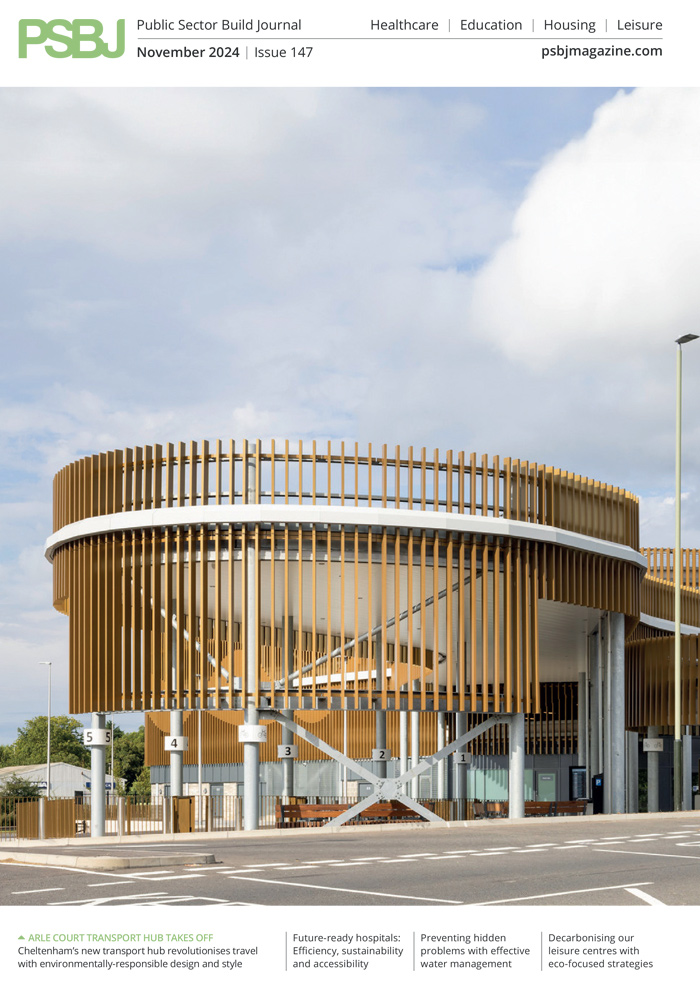In a time when the UK is working to improve and close its skills gap, it is important our education estates match the quality of professionals we hope to create. The UK’s ageing public estate needs to be upgraded if it hopes to create the next generation of leaders, says Richard Murray, Director at Drees & Sommer UK.
Drees & Sommer UK
By undergoing refurbishment works, teaching experiences can be improved across a whole hosts of quality metrics, including sustainability. The UK Government has legislated to reduce emissions to be fully net zero by 2050 with an interim target of 68% by 2030. The education sector has its own target of 78% by 2035. Decarbonisation measures are no longer desired, but an essential piece of criteria for quality estate conditions.
However, with college and school budgets under increasing pressure, long-term retrofitting plans are unsurprisingly falling down the agenda. It is capital funding that can be the key vehicle to unlocking the quality estates required to drive forward the UK’s skills economy but also its net-zero ambitions.
Routes to funding
The Department for Education (DfE) acknowledges its responsibility to improve conditions to bring education estates up to quality condition. Decarbonising will become a key byproduct of improving the quality of the overall estate and embedding decarbonisation and carbon reduction measures into how we view the future of the UK’s educational estate.
Knowing it is at the forefront of the Government’s objectives, various funding avenues have been opened by the Department of Education (DfE) and Department for Energy Security and Net Zero (DESNZ), for a broad range of sectors to apply for; education is no exception.
These departments have deployed a range of capital funding options, including the Further Education Capital Transformation Fund (FECTF), T-Levels Capital Fund, The Condition Improvement Fund, Public Sector Decarbonisation Scheme (PSDS) and Low Carbon Skills Fund (LCSF). Alongside this, there are formula-based capital allocations such as the Schools Condition Allocations and the one-off £500m energy-efficiency upgrades funding for colleges and schools announced by DfE almost 12 months ago.
Launched in September 2020, the Public Sector Decarbonisation Scheme (PSDS) is one of the biggest fund allocations for public sector bodies, which looks to progress heat decarbonisation and the implementation of energy-efficiency measures. Phase 3 of the PSDS provided over £1.425bn of grant funding over the financial years 2022 to 2025. Phase 4, with an additional £1.17bn, is critical for unlocking this capital is critical for colleges, schools and other educational estates in meeting what can feel like an impossible deadline for net zero.
Unlocking net zero through capital funding
Drees & Sommer UK has been working with Calderdale College in West Yorkshire, where the school has received a green light to undergo a £7.5m transformation.
Scheduled to be complete in August 2024, the project would not have been possible without the £5.5m of capital funding granted from the DfE. The team at Drees & Sommer UK worked with the college from the outset, supporting it in securing the grant via the Further Education Condition Transformation Fund (FECTF).
The funding will be used to transform its facilities and significantly improve energy efficiency. As part of this, the Percival Whitley Centre will benefit from a new, thermally-insulated rendered finish, photovoltaics, LED and hot water upgrades. It will not only make the building warmer but secure the historic building’s long-term future by being more resilient and cost less to run.
Currently, 51% of the district’s carbon emissions comes from its buildings. This project will contribute to Calderdale Council’s pledge to become net zero by 2038. It will also benefit more than 2000 young people, adults, apprentices and employees that the college welcomes each week.
Andrew Harrison, Vice Principal – Corporate Services at Calderdale College and Project Lead, said: “This funding has come at a critical time for the college, as the nation faces increased energy costs. The project will not only help to reduce rising energy bills, but it will also make a positive contribution to Calderdale’s sustainability agenda whilst also giving us a modern exterior that is in keeping with its original facade.”
Another example of unlocking decarbonisation through funding is Cheshire College South and West. Recent examples of the works undertaken at the college have been at the Crewe Campus, where Drees & Sommer UK provided multidisciplinary support, led by their specialist energy and sustainability team.
The scheme, now completed, has reduced the Crewe Campus, carbon emissions by circa 60%. The project at Crewe Campus was supported by FECTF dealing with heating pipework and radiator issues which, by careful programming and specification, allowed a further PSDS (Phase 3A) decarbonisation scheme to be realised by replacing a large part of the gas boilers and installing air-source heat pumps. Combining funding streams in this way enabled a scheme that might otherwise have been unaffordable to be completed and helped the college transition towards a low-carbon future.
The PSDS has also been used on more than just Crewe Campus; funding has subsequently been secured for both the Chester (Phase 3B) and Ellesmere Port (Phase 3C) campuses, which are currently ongoing.
With education providers all over the country being under resourced to deal with their sub-standard buildings, the added pressure to meet net-zero targets means the various pots of UK Government capital funding they’re entitled to bid for are valuable vehicles for sustainable development.
Opening up this funding can take away some of the headaches and allow colleges and schools to take their first steps in improving the quality and sustainability for today and tomorrow.

Richard Murray is the Director at Drees & Sommer UK












